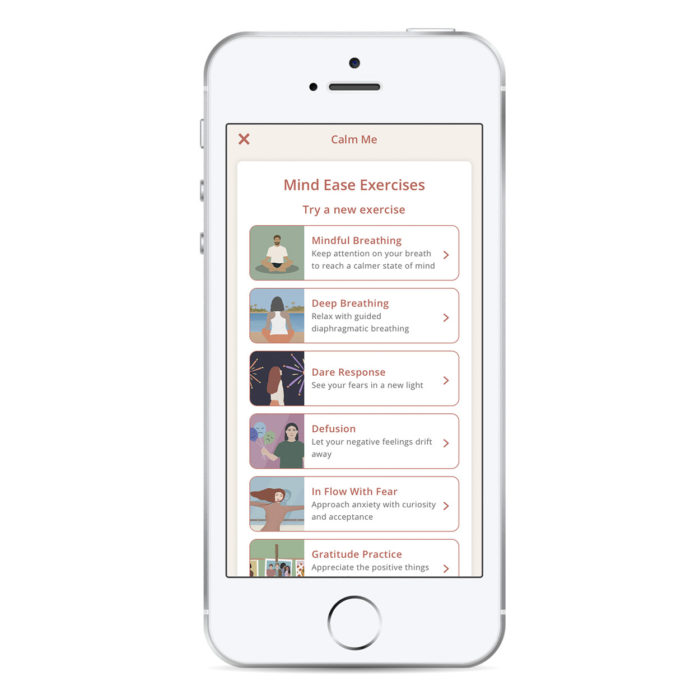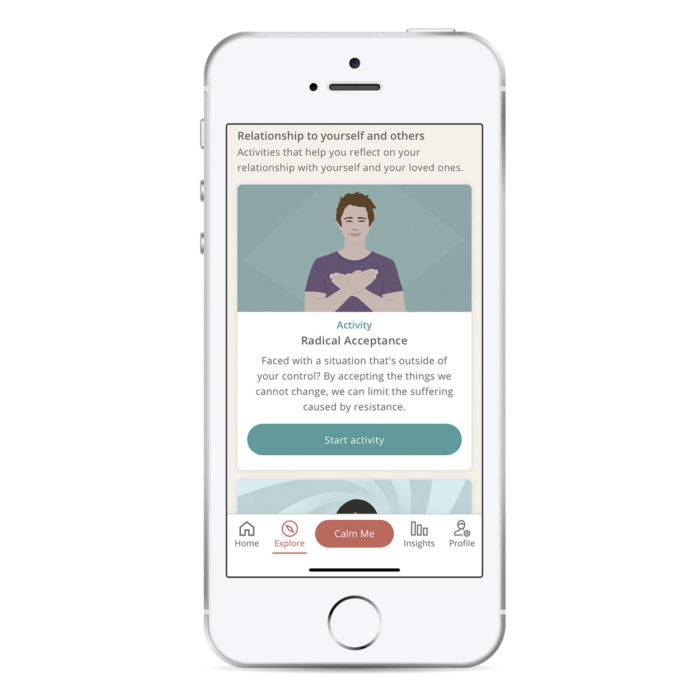▶ Dealing With Despair: 6 Ways To Find Hope
Despair, the loss of hope for the future, is one of the most difficult experiences. Here's how to find strength and hope in times of despair.
Despair can often appear out of the blue. We may suffer a tragic loss of a loved one or receive devastating news about our health. Maybe a scary world event suddenly unfolds. Our lives can drastically change over night.
Or despair may emerge slowly, its heaviness inching into our hearts more and more each day. It might be the increasing unhappiness in a relationship. Perhaps it’s the gradual loss of fulfilment in our work. Or growing anxiety over climate change.
No matter its roots, despair can lead us to a dark and sorrowful place. We may experience debilitating exhaustion, tearfulness, panic, even shame. Hopelessness, true to its name, convinces us that there is no way out. No point in trying, nothing that can be done to alleviate our misery.
At Mind Ease, we believe that there is light to be found even on our hardest days. Below we have collected strategies to help you cultivate resilience and rediscover hope.
1. Take one small step at a time
Despair often comes with increased fatigue and a general sense of resignation. As a result, we may lose motivation for everyday activities. With a gloomy outlook on the future, what’s the point in washing the dishes? Apathy and loss of interest are normal responses to our difficulties. However, in the long run, avoiding things can keep us trapped in our heavy emotions.
Despite our instinct to withdraw, participating in daily activities can be a healthy way of coping with our grief. It can provide us with comfort, distraction, and perhaps even meaning.
Trying to stick to our daily routines of getting up in the morning, getting dressed, having regular meals, interacting with others and going to bed at a reasonable time, can all help maintain our mental health when times are hard.
Staying active can also prevent physical problems such as insomnia, indigestion or pain that often accompany despair and depression.
But how can we find the strength to do anything when we feel weighed down by anguish?
By focusing on the next small step in front of you. For example, if you are lying in bed, you can start just by sitting up. That’s all you have to focus on for now. Once you manage that, try standing up.
Instead of trying to figure out your entire life, pay attention only to the next five minutes. The tea you are brewing. The meal you are eating. With each small step, it will get a little bit easier and overwhelming tasks will become more manageable.
If you are not sure what activities to do, try asking yourself:
How would I spend my time today if I had hope? What kinds of things do I enjoy when I feel okay?
Here are some tips for activities that can relieve low mood:
- Spend some time in nature. The outdoors can be incredibly therapeutic, especially when the weather is nice and when we combine it with a physical activity, like hiking or cycling.
- Find solace in reading a book, watching a movie or playing a game. Or learn about other forms of self care. Remember that it’s okay to slow down and take a break, you don’t need to be busy all of the time.
- Express your feelings through creativity. Drawing, painting, dancing, writing or playing music can be healing outlets for our sadness (and can also be fun!).
- Make something. Practical projects can boost our confidence and help us feel more in control. How about baking a cake or fixing something in the house?
- Try something new for the first time. Is there a hobby you’ve always wanted to explore? Or something you used to enjoy a long time ago? New activities can help us rebuild our identity in times of transition and change.
Even though you may not feel like these activities can help, give them a try – even if just for a few minutes. Spending time on meaningful pursuits can help us feel a bit better, which in turn raises our energy and brightens our perspective a little more.
The act of doing meaningful things is so powerful that it is often used in psychotherapy. In fact, there is a whole treatment based on this idea, called behavioural activation – and it has been found to be very effective for depression.
Try to stay patient and the journey will get easier with each small step.
2. Connect to your senses
You may have heard of mindfulness meditation, but did you know that it can help with overcoming despair? While not everyone enjoys meditating, there are simple mindfulness techniques you can try without having to sit down on a cushion with your eyes closed.
Connecting with our senses is a simple way to anchor our awareness in the present moment. For example, you can become mindful of your feet touching the ground as you walk, or feel the warmth of the water as you wash your hands.
Why can this help our mental health? Because the more we can focus on these sensations, the less attention we pay to the thoughts and feelings related to our despair. This can calm our mind and bring unexpected relief.
You can try the 5 4 3 2 1 technique to help focus your attention on the present moment:
- Name 5 things you can see
- Name 4 things you can touch
- Name 3 things you can hear
- Name 2 things you can smell
- Name 1 thing you can taste
Whenever you notice the presence of despair, try to bring your attention back to your senses. The more we practice grounding ourselves in our body, the more it will weaken the grip of any troubling thoughts. You can find more tips on these mindfulness techniques here.
You can also try other calming exercises, including Mindful Breathing, Defusion, and Progressive Relaxation, using the Mind Ease app.

3. Reflect on your thoughts
Despair can come with a range of unpleasant thoughts and emotions. We may experience fear, denial and dismay. We may become discouraged about the future or agonise about past mistakes. We might even feel inner turmoil or emptiness.
While it may be tempting to avoid our negative thoughts, it can actually be helpful to turn our attention to them – if done in the right way.
Some people find journaling very helpful for this. Pouring your heart out on a piece of paper can alleviate acute stress and bring a sense of relief. This is because writing down how we’re feeling can help us gain some distance from our despair, which can weaken its power over us.
Here are some questions you might want to ask yourself as you reflect on your thoughts and feelings:
- Am I catastrophizing?
Sometimes our situations really are desperate and there is nothing we can do to change them. However, often we can be too quick to imagine worst case scenarios that we don’t have any evidence for. In such situations, learning to embrace uncertainty while refocusing on our day-to-day activities instead of our worries can alleviate our suffering.
- Am I only focusing on the negative?
Research shows that depression and burnout can negatively bias our memory. For example, when we are angry with someone, we might only remember the times when they upset us in the past, while forgetting all of the times when they were kind to us.
As you are reflecting on your thoughts, check to see if you are disproportionately paying attention to the things that are going wrong. Try to consider the aspects of your life that you can be grateful for right now. You can find more tips here on how to reframe negative thoughts.
- Am I being unkind to myself?
During times of despair, we may be quick to judge ourselves for how much we are hurting. We may experience self-doubt, frustration or even worthlessness. In times like these, it’s all the more important to find self-compassion for the emotions that we feel. Being gentle with our heartache can help us recover a lot faster.
In the Mind Ease app, you may find the Radical Acceptance and Self Compassion exercises particularly useful for this.

4. Look for meaning
Even our worst experiences can be a source of growth when we are able to find meaning in them.
In his seminal book, Man’s Search For Meaning, Viktor Frankl describes how he coped with the unimaginable cruelty and hardship of the holocaust. In his darkest moments, he would imagine that one day he would use his dreadful experiences to help others.
“Those who have a ‘why’ to live, can bear with almost any ‘how’.”
Viktor Frankl
Just like Frankl, we may be able to find ways of turning our despair into gaining a new sense of purpose. Some psychologists call this process post-traumatic growth – the ability to find a renewed appreciation of life and a deeper connection with humanity as a result of despair and trauma. To explore this possibility, try asking yourself:
- Can I become a stronger, wiser person from this experience?
- What can I learn from this? How can I grow?
- How can I use this experience to make the world a better place?
According to Frankl, we can find meaning through the work we do, the experiences we have and the attitude we take towards unavoidable suffering. Everyone’s path will be unique. Some may find spiritual fulfilment in faith or prayer. Others may volunteer or campaign to fight for their values. Either way, turning our despair into kindness for others can be incredibly uplifting and can help us overcome feelings of helplessness.
In the Mind Ease app, the Stoic Reflection exercise can help you figure out how to live according to your greatest strengths and values.

5. Lean on others
When we feel overwhelmed by distress, it can be difficult to open up. We may withdraw from others, fearing their response to our struggles. Perhaps we have been taught to feel guilty when asking for help or we don’t want to feel like a burden.
But periods of despair are when we need each other the most. Just like with inactivity, isolation often only makes us feel worse.
We all have an innate need for closeness with others as a way to help us feel safe.
Our greatest challenges are also our greatest opportunities to deepen emotional closeness with our loved ones.
Friends and family can give us empathy and reassurance, as well as providing practical solutions that can reduce our stress. They can drive us to doctors’ appointments or help us move houses. Importantly, they can help us laugh, which might be exactly what we need to find strength and optimism again.
Sometimes it can be difficult to find someone who can support us in the right way. Unfortunately, our culture promotes many ideas of toxic positivity instead of teaching us how to hold space for each other’s vulnerability.
If you feel like others are invalidating your experience with statements such as “It’s really not that bad” or “Just look on the bright side”, they may not be the right people to share your struggles with.
If you don’t know who to reach out to, you can try speaking to someone anonymously, over the phone or by email, using free services such as the Samaritans, 7 Cups or Crisis Textline.
Lastly, pets can also be an incredible source of love and comfort. Their unconditional affection can heal our wounds and increase our wellbeing. Even if you can’t get a pet yourself, you may be able to volunteer at a shelter or pet-sit for somebody else.
6. Seek professional help
Sometimes despair can get so difficult that we struggle with everyday functioning. We may feel like it’s impossible to participate in school or work activities. We may experience irritability and anger to such an extent that our relationships suffer. We may turn to alcohol, drugs or other unhelpful coping strategies for temporary escape from our pain.
In such situations, we recommend that you speak to your doctor or a therapist. If you can’t find anyone in your area, it may also be worth exploring online therapy.
There is no shame in seeking professional help and it can often help us get better faster than if we try to do it all on our own.
You may also be able to find helpful resources for specific issues that you might be facing, such as debt, housing instability or unemployment. If you are affected by a chronic illness, addiction or gambling, there may be patient groups or online forums that can support you.
If things ever feel so hopeless that you feel like you can’t carry on, it’s essential that you reach out for support. If you experience any urges to harm yourself or others, please do not hesitate to call your local emergency number or ambulance. You can find a global list of helplines here: https://bit.ly/3pkeVaM
On behalf of the Mind Ease team, we are sending you strength and care. Please remember that despair is not a permanent state and things can get better.
You can find many more resources to help you along the way in the Mind Ease app.





